Strategic Analysis of Marriott International in Hospitality Industry
VerifiedAdded on 2023/06/09
|30
|6275
|148
Report
AI Summary
This report provides a comprehensive strategic analysis of Marriott International within the global hospitality industry, focusing on its potential expansion into Iceland. The analysis includes a SWOT assessment, PEST analysis of Iceland's macro environment, and Porter's Five Forces to evaluate the competitive landscape. It explores Marriott's strategic positioning, segmentation strategies, and market growth strategies, including organic expansion. The report also examines different market entry modes and concludes with recommendations for successful implementation of strategic management principles, highlighting Marriott's resources and capabilities for market expansion.
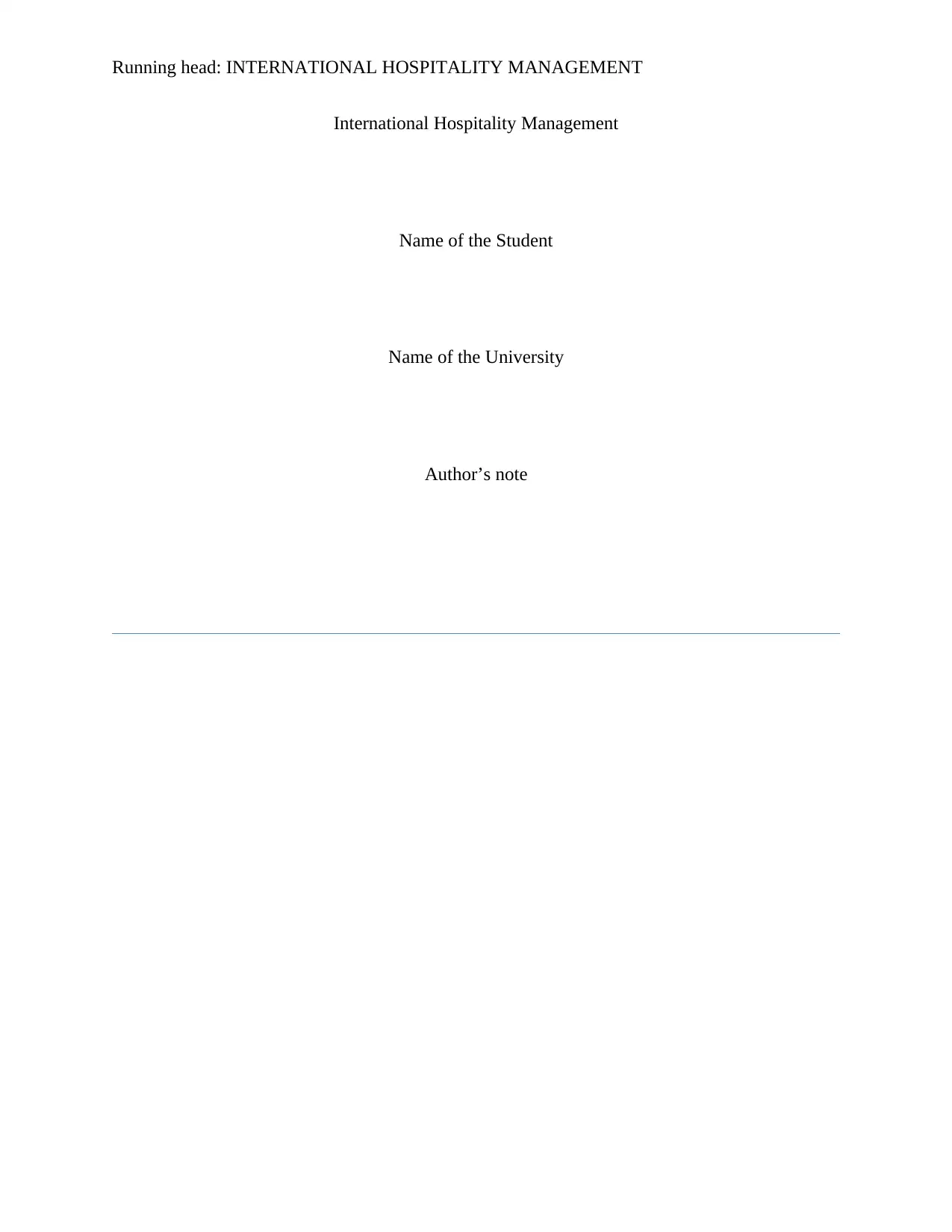
Running head: INTERNATIONAL HOSPITALITY MANAGEMENT
International Hospitality Management
Name of the Student
Name of the University
Author’s note
International Hospitality Management
Name of the Student
Name of the University
Author’s note
Paraphrase This Document
Need a fresh take? Get an instant paraphrase of this document with our AI Paraphraser
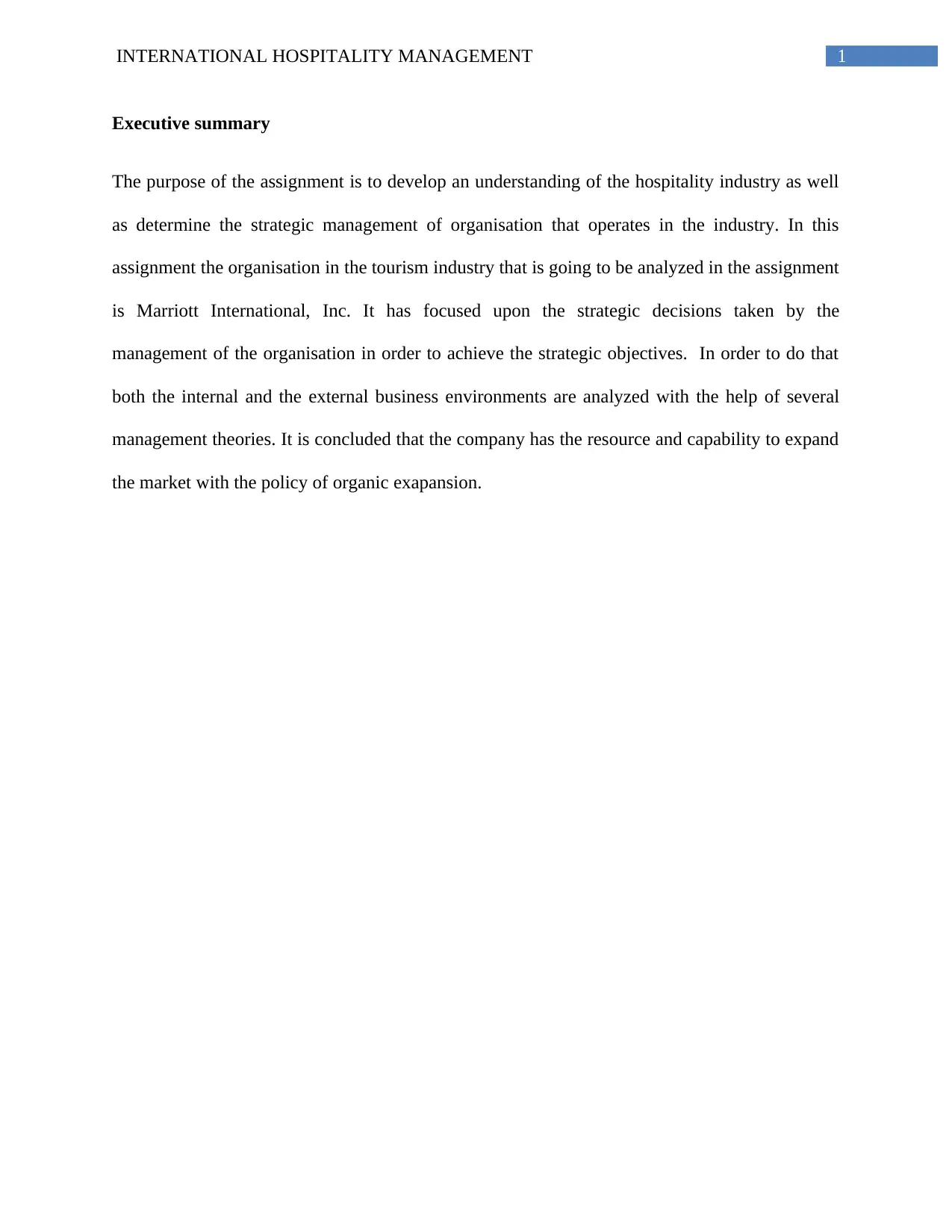
1INTERNATIONAL HOSPITALITY MANAGEMENT
Executive summary
The purpose of the assignment is to develop an understanding of the hospitality industry as well
as determine the strategic management of organisation that operates in the industry. In this
assignment the organisation in the tourism industry that is going to be analyzed in the assignment
is Marriott International, Inc. It has focused upon the strategic decisions taken by the
management of the organisation in order to achieve the strategic objectives. In order to do that
both the internal and the external business environments are analyzed with the help of several
management theories. It is concluded that the company has the resource and capability to expand
the market with the policy of organic exapansion.
Executive summary
The purpose of the assignment is to develop an understanding of the hospitality industry as well
as determine the strategic management of organisation that operates in the industry. In this
assignment the organisation in the tourism industry that is going to be analyzed in the assignment
is Marriott International, Inc. It has focused upon the strategic decisions taken by the
management of the organisation in order to achieve the strategic objectives. In order to do that
both the internal and the external business environments are analyzed with the help of several
management theories. It is concluded that the company has the resource and capability to expand
the market with the policy of organic exapansion.
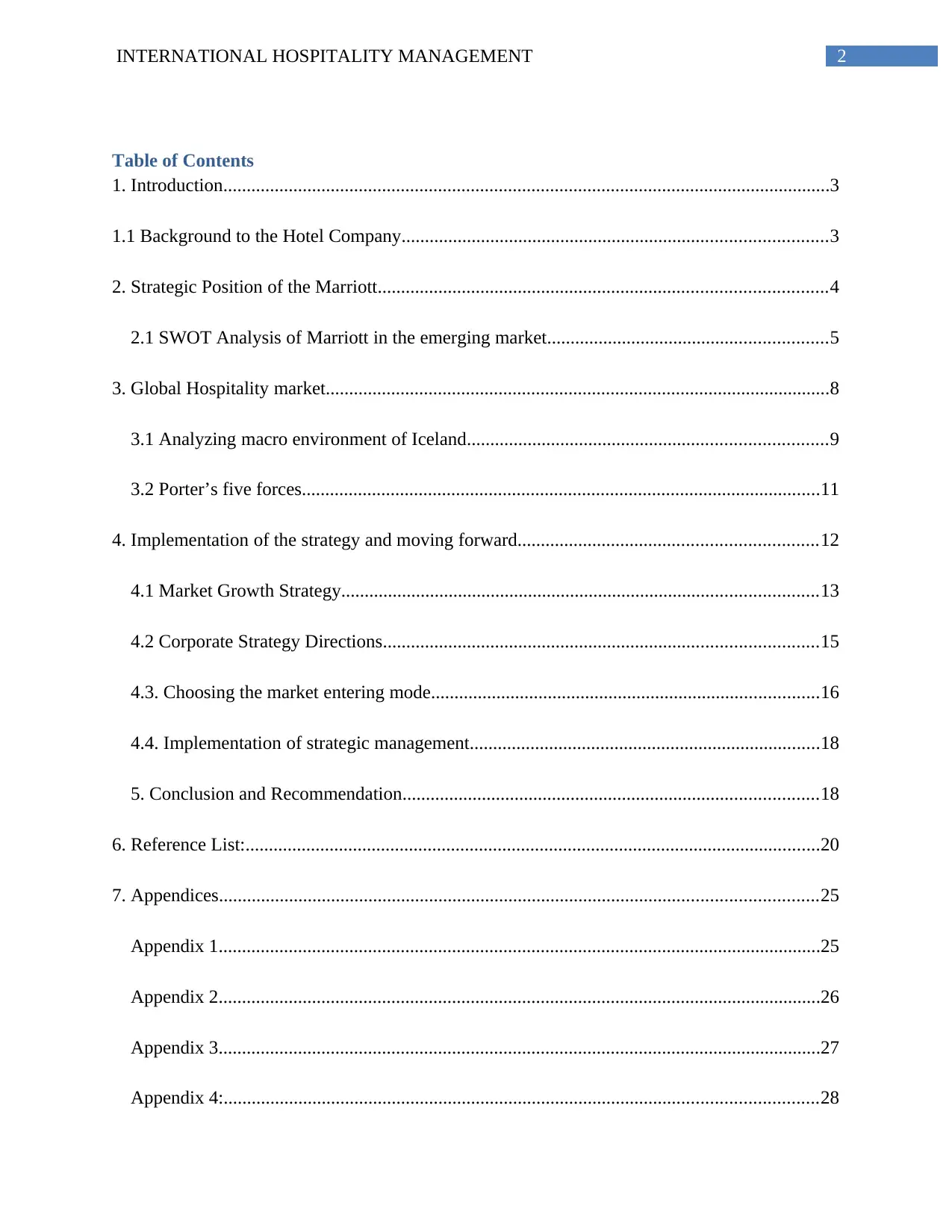
2INTERNATIONAL HOSPITALITY MANAGEMENT
Table of Contents
1. Introduction..................................................................................................................................3
1.1 Background to the Hotel Company...........................................................................................3
2. Strategic Position of the Marriott................................................................................................4
2.1 SWOT Analysis of Marriott in the emerging market............................................................5
3. Global Hospitality market............................................................................................................8
3.1 Analyzing macro environment of Iceland.............................................................................9
3.2 Porter’s five forces...............................................................................................................11
4. Implementation of the strategy and moving forward................................................................12
4.1 Market Growth Strategy......................................................................................................13
4.2 Corporate Strategy Directions.............................................................................................15
4.3. Choosing the market entering mode...................................................................................16
4.4. Implementation of strategic management...........................................................................18
5. Conclusion and Recommendation.........................................................................................18
6. Reference List:...........................................................................................................................20
7. Appendices................................................................................................................................25
Appendix 1.................................................................................................................................25
Appendix 2.................................................................................................................................26
Appendix 3.................................................................................................................................27
Appendix 4:...............................................................................................................................28
Table of Contents
1. Introduction..................................................................................................................................3
1.1 Background to the Hotel Company...........................................................................................3
2. Strategic Position of the Marriott................................................................................................4
2.1 SWOT Analysis of Marriott in the emerging market............................................................5
3. Global Hospitality market............................................................................................................8
3.1 Analyzing macro environment of Iceland.............................................................................9
3.2 Porter’s five forces...............................................................................................................11
4. Implementation of the strategy and moving forward................................................................12
4.1 Market Growth Strategy......................................................................................................13
4.2 Corporate Strategy Directions.............................................................................................15
4.3. Choosing the market entering mode...................................................................................16
4.4. Implementation of strategic management...........................................................................18
5. Conclusion and Recommendation.........................................................................................18
6. Reference List:...........................................................................................................................20
7. Appendices................................................................................................................................25
Appendix 1.................................................................................................................................25
Appendix 2.................................................................................................................................26
Appendix 3.................................................................................................................................27
Appendix 4:...............................................................................................................................28
⊘ This is a preview!⊘
Do you want full access?
Subscribe today to unlock all pages.

Trusted by 1+ million students worldwide
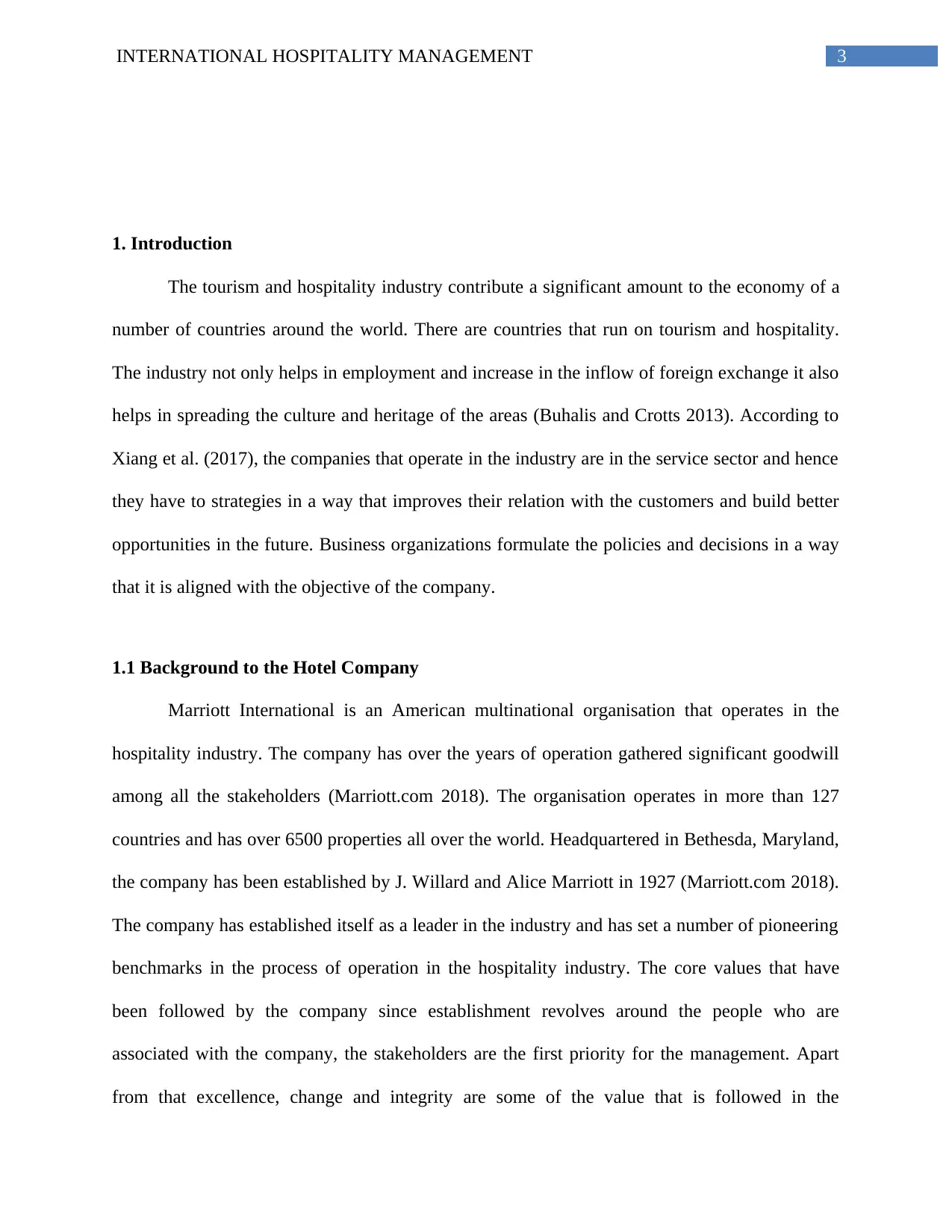
3INTERNATIONAL HOSPITALITY MANAGEMENT
1. Introduction
The tourism and hospitality industry contribute a significant amount to the economy of a
number of countries around the world. There are countries that run on tourism and hospitality.
The industry not only helps in employment and increase in the inflow of foreign exchange it also
helps in spreading the culture and heritage of the areas (Buhalis and Crotts 2013). According to
Xiang et al. (2017), the companies that operate in the industry are in the service sector and hence
they have to strategies in a way that improves their relation with the customers and build better
opportunities in the future. Business organizations formulate the policies and decisions in a way
that it is aligned with the objective of the company.
1.1 Background to the Hotel Company
Marriott International is an American multinational organisation that operates in the
hospitality industry. The company has over the years of operation gathered significant goodwill
among all the stakeholders (Marriott.com 2018). The organisation operates in more than 127
countries and has over 6500 properties all over the world. Headquartered in Bethesda, Maryland,
the company has been established by J. Willard and Alice Marriott in 1927 (Marriott.com 2018).
The company has established itself as a leader in the industry and has set a number of pioneering
benchmarks in the process of operation in the hospitality industry. The core values that have
been followed by the company since establishment revolves around the people who are
associated with the company, the stakeholders are the first priority for the management. Apart
from that excellence, change and integrity are some of the value that is followed in the
1. Introduction
The tourism and hospitality industry contribute a significant amount to the economy of a
number of countries around the world. There are countries that run on tourism and hospitality.
The industry not only helps in employment and increase in the inflow of foreign exchange it also
helps in spreading the culture and heritage of the areas (Buhalis and Crotts 2013). According to
Xiang et al. (2017), the companies that operate in the industry are in the service sector and hence
they have to strategies in a way that improves their relation with the customers and build better
opportunities in the future. Business organizations formulate the policies and decisions in a way
that it is aligned with the objective of the company.
1.1 Background to the Hotel Company
Marriott International is an American multinational organisation that operates in the
hospitality industry. The company has over the years of operation gathered significant goodwill
among all the stakeholders (Marriott.com 2018). The organisation operates in more than 127
countries and has over 6500 properties all over the world. Headquartered in Bethesda, Maryland,
the company has been established by J. Willard and Alice Marriott in 1927 (Marriott.com 2018).
The company has established itself as a leader in the industry and has set a number of pioneering
benchmarks in the process of operation in the hospitality industry. The core values that have
been followed by the company since establishment revolves around the people who are
associated with the company, the stakeholders are the first priority for the management. Apart
from that excellence, change and integrity are some of the value that is followed in the
Paraphrase This Document
Need a fresh take? Get an instant paraphrase of this document with our AI Paraphraser
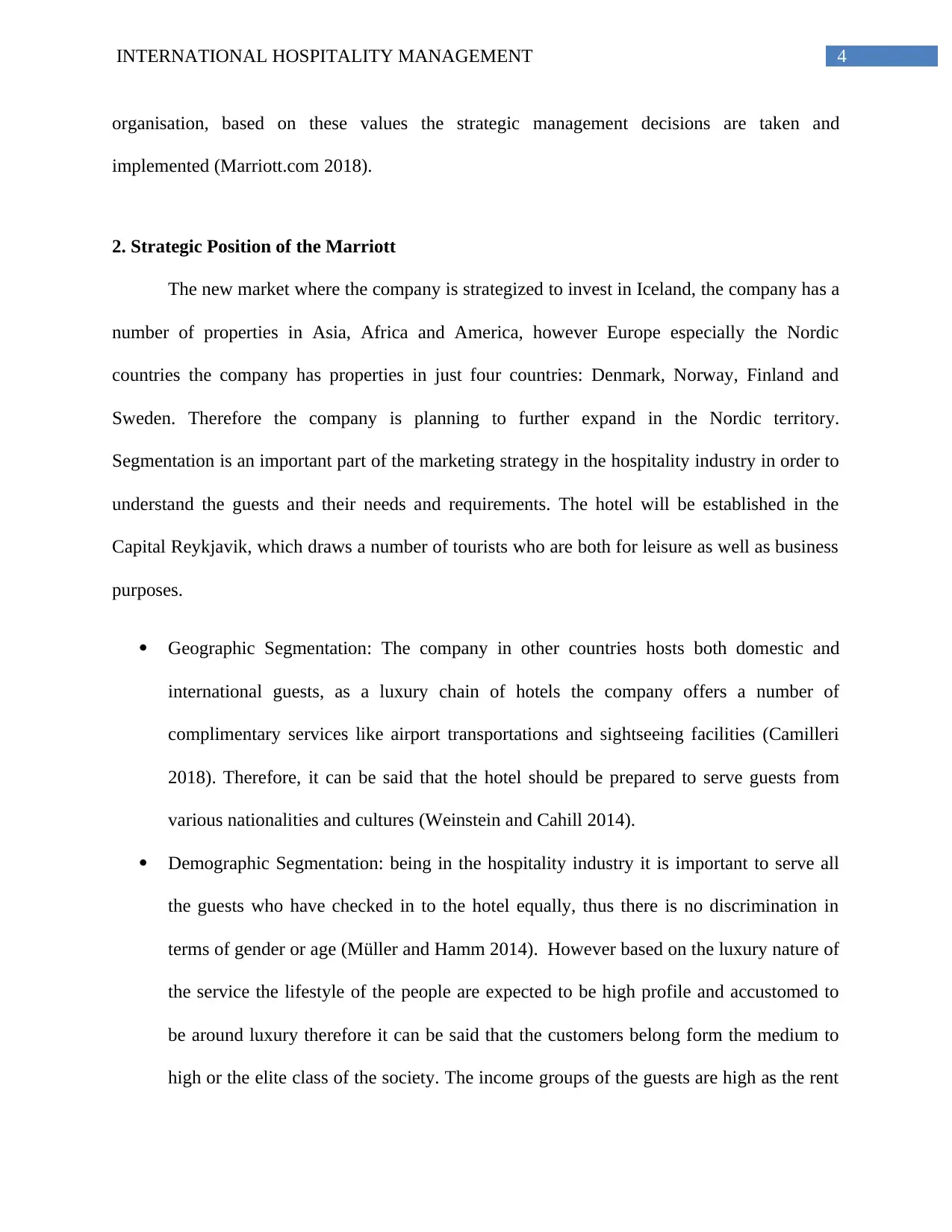
4INTERNATIONAL HOSPITALITY MANAGEMENT
organisation, based on these values the strategic management decisions are taken and
implemented (Marriott.com 2018).
2. Strategic Position of the Marriott
The new market where the company is strategized to invest in Iceland, the company has a
number of properties in Asia, Africa and America, however Europe especially the Nordic
countries the company has properties in just four countries: Denmark, Norway, Finland and
Sweden. Therefore the company is planning to further expand in the Nordic territory.
Segmentation is an important part of the marketing strategy in the hospitality industry in order to
understand the guests and their needs and requirements. The hotel will be established in the
Capital Reykjavik, which draws a number of tourists who are both for leisure as well as business
purposes.
Geographic Segmentation: The company in other countries hosts both domestic and
international guests, as a luxury chain of hotels the company offers a number of
complimentary services like airport transportations and sightseeing facilities (Camilleri
2018). Therefore, it can be said that the hotel should be prepared to serve guests from
various nationalities and cultures (Weinstein and Cahill 2014).
Demographic Segmentation: being in the hospitality industry it is important to serve all
the guests who have checked in to the hotel equally, thus there is no discrimination in
terms of gender or age (Müller and Hamm 2014). However based on the luxury nature of
the service the lifestyle of the people are expected to be high profile and accustomed to
be around luxury therefore it can be said that the customers belong form the medium to
high or the elite class of the society. The income groups of the guests are high as the rent
organisation, based on these values the strategic management decisions are taken and
implemented (Marriott.com 2018).
2. Strategic Position of the Marriott
The new market where the company is strategized to invest in Iceland, the company has a
number of properties in Asia, Africa and America, however Europe especially the Nordic
countries the company has properties in just four countries: Denmark, Norway, Finland and
Sweden. Therefore the company is planning to further expand in the Nordic territory.
Segmentation is an important part of the marketing strategy in the hospitality industry in order to
understand the guests and their needs and requirements. The hotel will be established in the
Capital Reykjavik, which draws a number of tourists who are both for leisure as well as business
purposes.
Geographic Segmentation: The company in other countries hosts both domestic and
international guests, as a luxury chain of hotels the company offers a number of
complimentary services like airport transportations and sightseeing facilities (Camilleri
2018). Therefore, it can be said that the hotel should be prepared to serve guests from
various nationalities and cultures (Weinstein and Cahill 2014).
Demographic Segmentation: being in the hospitality industry it is important to serve all
the guests who have checked in to the hotel equally, thus there is no discrimination in
terms of gender or age (Müller and Hamm 2014). However based on the luxury nature of
the service the lifestyle of the people are expected to be high profile and accustomed to
be around luxury therefore it can be said that the customers belong form the medium to
high or the elite class of the society. The income groups of the guests are high as the rent
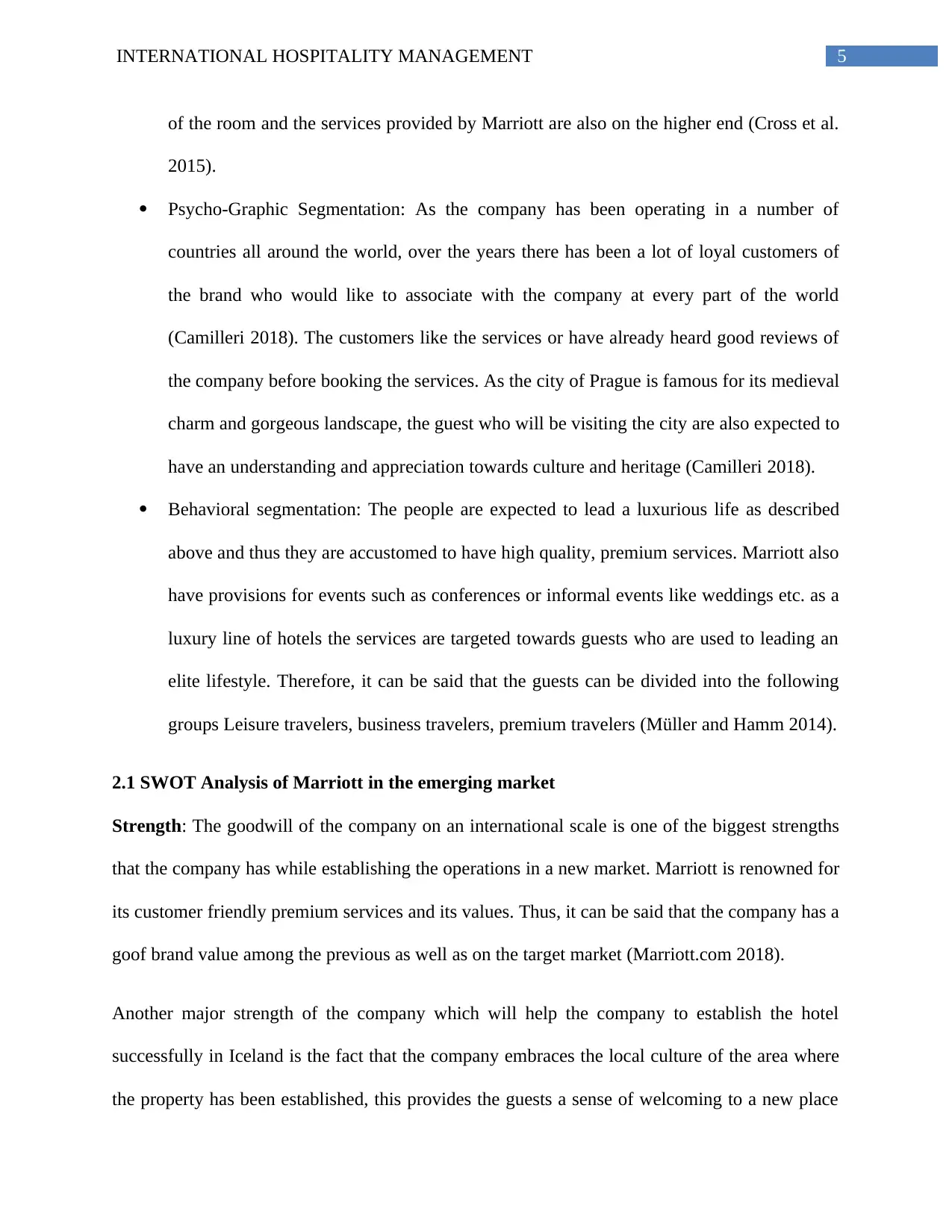
5INTERNATIONAL HOSPITALITY MANAGEMENT
of the room and the services provided by Marriott are also on the higher end (Cross et al.
2015).
Psycho-Graphic Segmentation: As the company has been operating in a number of
countries all around the world, over the years there has been a lot of loyal customers of
the brand who would like to associate with the company at every part of the world
(Camilleri 2018). The customers like the services or have already heard good reviews of
the company before booking the services. As the city of Prague is famous for its medieval
charm and gorgeous landscape, the guest who will be visiting the city are also expected to
have an understanding and appreciation towards culture and heritage (Camilleri 2018).
Behavioral segmentation: The people are expected to lead a luxurious life as described
above and thus they are accustomed to have high quality, premium services. Marriott also
have provisions for events such as conferences or informal events like weddings etc. as a
luxury line of hotels the services are targeted towards guests who are used to leading an
elite lifestyle. Therefore, it can be said that the guests can be divided into the following
groups Leisure travelers, business travelers, premium travelers (Müller and Hamm 2014).
2.1 SWOT Analysis of Marriott in the emerging market
Strength: The goodwill of the company on an international scale is one of the biggest strengths
that the company has while establishing the operations in a new market. Marriott is renowned for
its customer friendly premium services and its values. Thus, it can be said that the company has a
goof brand value among the previous as well as on the target market (Marriott.com 2018).
Another major strength of the company which will help the company to establish the hotel
successfully in Iceland is the fact that the company embraces the local culture of the area where
the property has been established, this provides the guests a sense of welcoming to a new place
of the room and the services provided by Marriott are also on the higher end (Cross et al.
2015).
Psycho-Graphic Segmentation: As the company has been operating in a number of
countries all around the world, over the years there has been a lot of loyal customers of
the brand who would like to associate with the company at every part of the world
(Camilleri 2018). The customers like the services or have already heard good reviews of
the company before booking the services. As the city of Prague is famous for its medieval
charm and gorgeous landscape, the guest who will be visiting the city are also expected to
have an understanding and appreciation towards culture and heritage (Camilleri 2018).
Behavioral segmentation: The people are expected to lead a luxurious life as described
above and thus they are accustomed to have high quality, premium services. Marriott also
have provisions for events such as conferences or informal events like weddings etc. as a
luxury line of hotels the services are targeted towards guests who are used to leading an
elite lifestyle. Therefore, it can be said that the guests can be divided into the following
groups Leisure travelers, business travelers, premium travelers (Müller and Hamm 2014).
2.1 SWOT Analysis of Marriott in the emerging market
Strength: The goodwill of the company on an international scale is one of the biggest strengths
that the company has while establishing the operations in a new market. Marriott is renowned for
its customer friendly premium services and its values. Thus, it can be said that the company has a
goof brand value among the previous as well as on the target market (Marriott.com 2018).
Another major strength of the company which will help the company to establish the hotel
successfully in Iceland is the fact that the company embraces the local culture of the area where
the property has been established, this provides the guests a sense of welcoming to a new place
⊘ This is a preview!⊘
Do you want full access?
Subscribe today to unlock all pages.

Trusted by 1+ million students worldwide
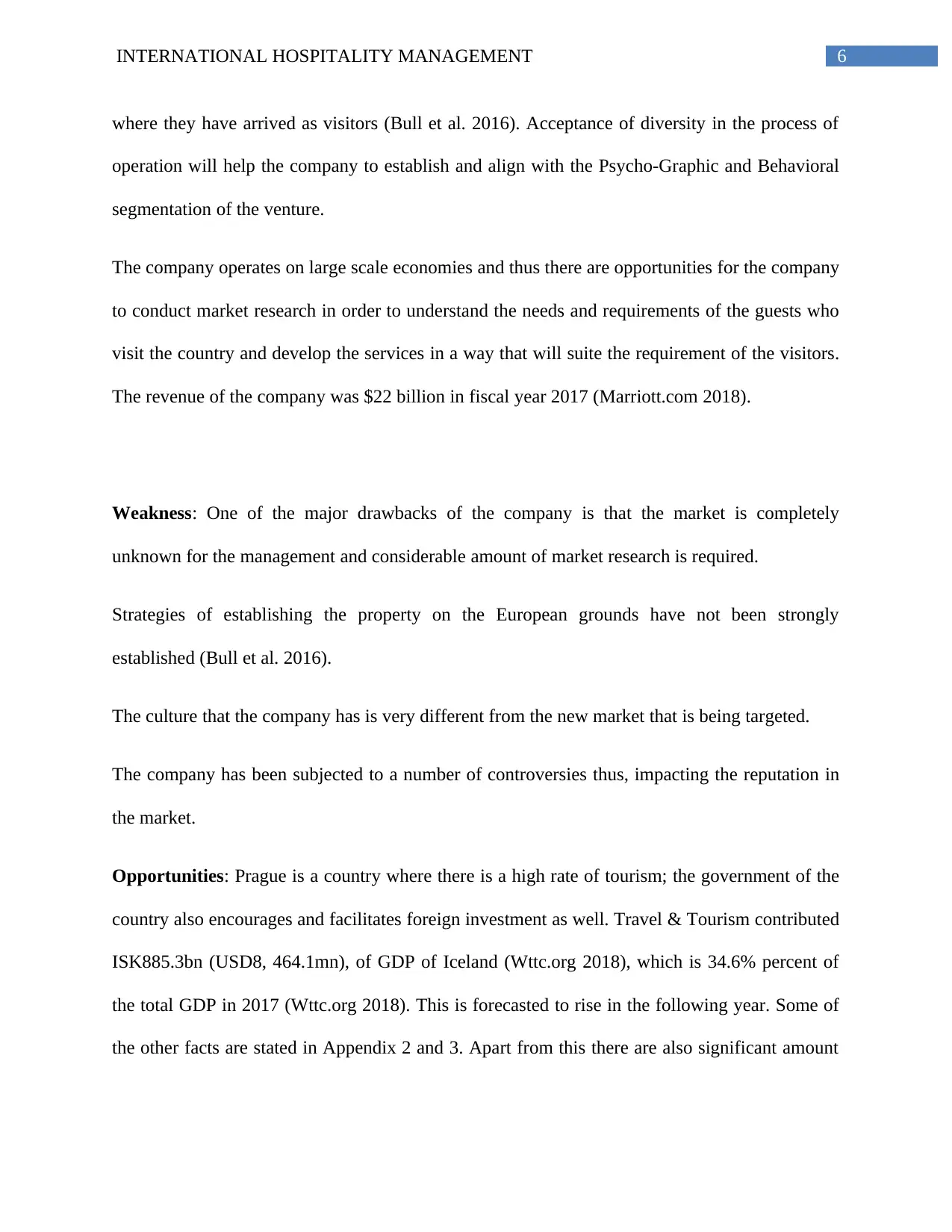
6INTERNATIONAL HOSPITALITY MANAGEMENT
where they have arrived as visitors (Bull et al. 2016). Acceptance of diversity in the process of
operation will help the company to establish and align with the Psycho-Graphic and Behavioral
segmentation of the venture.
The company operates on large scale economies and thus there are opportunities for the company
to conduct market research in order to understand the needs and requirements of the guests who
visit the country and develop the services in a way that will suite the requirement of the visitors.
The revenue of the company was $22 billion in fiscal year 2017 (Marriott.com 2018).
Weakness: One of the major drawbacks of the company is that the market is completely
unknown for the management and considerable amount of market research is required.
Strategies of establishing the property on the European grounds have not been strongly
established (Bull et al. 2016).
The culture that the company has is very different from the new market that is being targeted.
The company has been subjected to a number of controversies thus, impacting the reputation in
the market.
Opportunities: Prague is a country where there is a high rate of tourism; the government of the
country also encourages and facilitates foreign investment as well. Travel & Tourism contributed
ISK885.3bn (USD8, 464.1mn), of GDP of Iceland (Wttc.org 2018), which is 34.6% percent of
the total GDP in 2017 (Wttc.org 2018). This is forecasted to rise in the following year. Some of
the other facts are stated in Appendix 2 and 3. Apart from this there are also significant amount
where they have arrived as visitors (Bull et al. 2016). Acceptance of diversity in the process of
operation will help the company to establish and align with the Psycho-Graphic and Behavioral
segmentation of the venture.
The company operates on large scale economies and thus there are opportunities for the company
to conduct market research in order to understand the needs and requirements of the guests who
visit the country and develop the services in a way that will suite the requirement of the visitors.
The revenue of the company was $22 billion in fiscal year 2017 (Marriott.com 2018).
Weakness: One of the major drawbacks of the company is that the market is completely
unknown for the management and considerable amount of market research is required.
Strategies of establishing the property on the European grounds have not been strongly
established (Bull et al. 2016).
The culture that the company has is very different from the new market that is being targeted.
The company has been subjected to a number of controversies thus, impacting the reputation in
the market.
Opportunities: Prague is a country where there is a high rate of tourism; the government of the
country also encourages and facilitates foreign investment as well. Travel & Tourism contributed
ISK885.3bn (USD8, 464.1mn), of GDP of Iceland (Wttc.org 2018), which is 34.6% percent of
the total GDP in 2017 (Wttc.org 2018). This is forecasted to rise in the following year. Some of
the other facts are stated in Appendix 2 and 3. Apart from this there are also significant amount
Paraphrase This Document
Need a fresh take? Get an instant paraphrase of this document with our AI Paraphraser
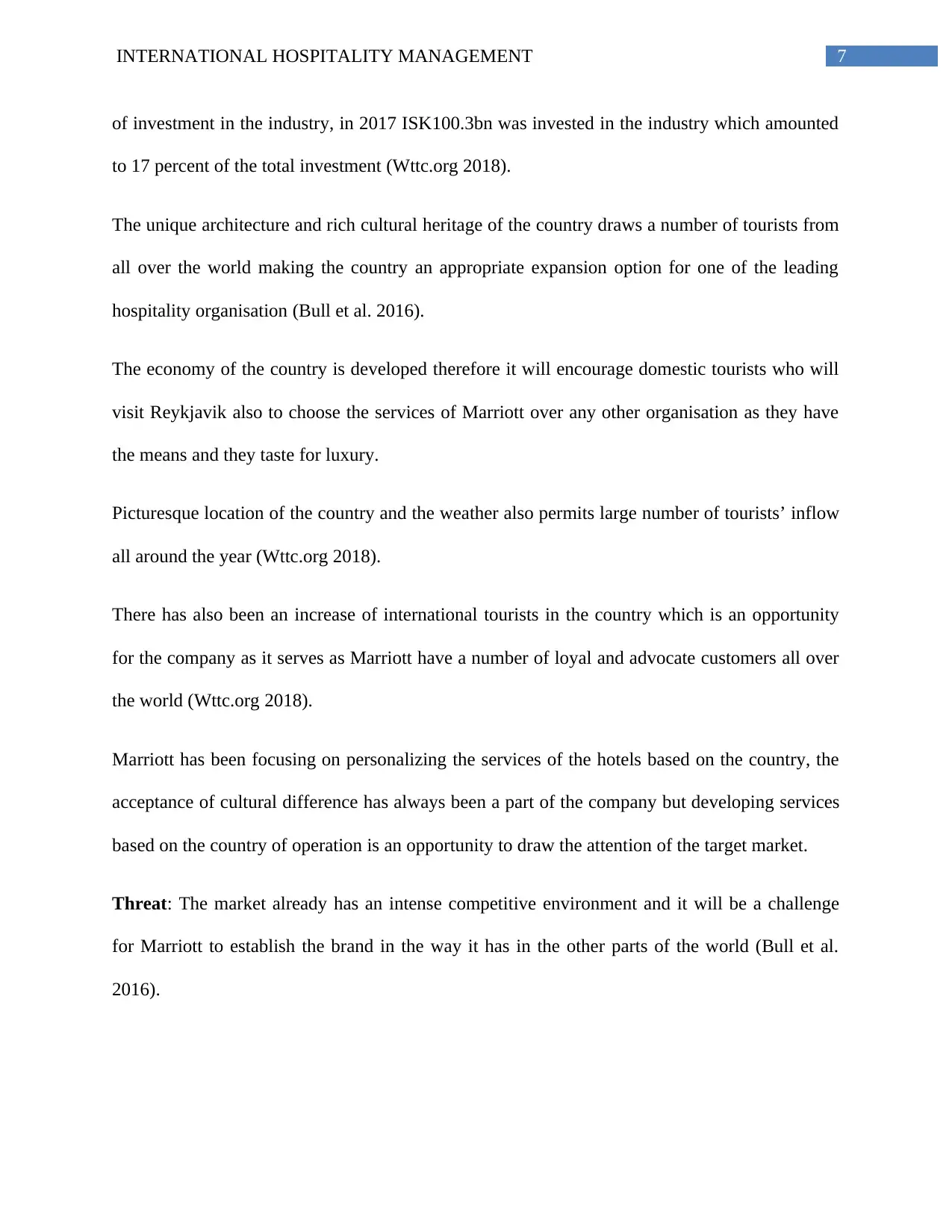
7INTERNATIONAL HOSPITALITY MANAGEMENT
of investment in the industry, in 2017 ISK100.3bn was invested in the industry which amounted
to 17 percent of the total investment (Wttc.org 2018).
The unique architecture and rich cultural heritage of the country draws a number of tourists from
all over the world making the country an appropriate expansion option for one of the leading
hospitality organisation (Bull et al. 2016).
The economy of the country is developed therefore it will encourage domestic tourists who will
visit Reykjavik also to choose the services of Marriott over any other organisation as they have
the means and they taste for luxury.
Picturesque location of the country and the weather also permits large number of tourists’ inflow
all around the year (Wttc.org 2018).
There has also been an increase of international tourists in the country which is an opportunity
for the company as it serves as Marriott have a number of loyal and advocate customers all over
the world (Wttc.org 2018).
Marriott has been focusing on personalizing the services of the hotels based on the country, the
acceptance of cultural difference has always been a part of the company but developing services
based on the country of operation is an opportunity to draw the attention of the target market.
Threat: The market already has an intense competitive environment and it will be a challenge
for Marriott to establish the brand in the way it has in the other parts of the world (Bull et al.
2016).
of investment in the industry, in 2017 ISK100.3bn was invested in the industry which amounted
to 17 percent of the total investment (Wttc.org 2018).
The unique architecture and rich cultural heritage of the country draws a number of tourists from
all over the world making the country an appropriate expansion option for one of the leading
hospitality organisation (Bull et al. 2016).
The economy of the country is developed therefore it will encourage domestic tourists who will
visit Reykjavik also to choose the services of Marriott over any other organisation as they have
the means and they taste for luxury.
Picturesque location of the country and the weather also permits large number of tourists’ inflow
all around the year (Wttc.org 2018).
There has also been an increase of international tourists in the country which is an opportunity
for the company as it serves as Marriott have a number of loyal and advocate customers all over
the world (Wttc.org 2018).
Marriott has been focusing on personalizing the services of the hotels based on the country, the
acceptance of cultural difference has always been a part of the company but developing services
based on the country of operation is an opportunity to draw the attention of the target market.
Threat: The market already has an intense competitive environment and it will be a challenge
for Marriott to establish the brand in the way it has in the other parts of the world (Bull et al.
2016).
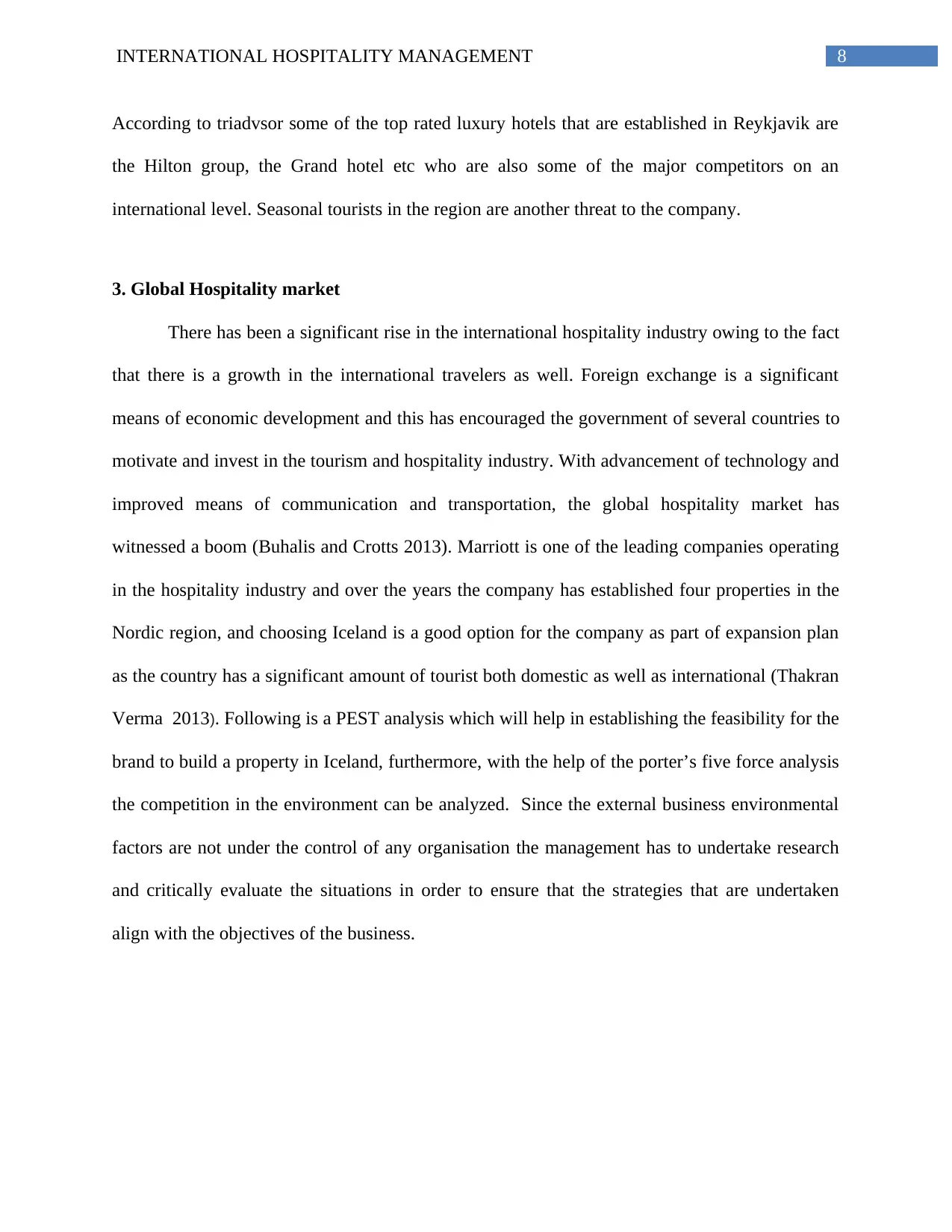
8INTERNATIONAL HOSPITALITY MANAGEMENT
According to triadvsor some of the top rated luxury hotels that are established in Reykjavik are
the Hilton group, the Grand hotel etc who are also some of the major competitors on an
international level. Seasonal tourists in the region are another threat to the company.
3. Global Hospitality market
There has been a significant rise in the international hospitality industry owing to the fact
that there is a growth in the international travelers as well. Foreign exchange is a significant
means of economic development and this has encouraged the government of several countries to
motivate and invest in the tourism and hospitality industry. With advancement of technology and
improved means of communication and transportation, the global hospitality market has
witnessed a boom (Buhalis and Crotts 2013). Marriott is one of the leading companies operating
in the hospitality industry and over the years the company has established four properties in the
Nordic region, and choosing Iceland is a good option for the company as part of expansion plan
as the country has a significant amount of tourist both domestic as well as international (Thakran
Verma 2013). Following is a PEST analysis which will help in establishing the feasibility for the
brand to build a property in Iceland, furthermore, with the help of the porter’s five force analysis
the competition in the environment can be analyzed. Since the external business environmental
factors are not under the control of any organisation the management has to undertake research
and critically evaluate the situations in order to ensure that the strategies that are undertaken
align with the objectives of the business.
According to triadvsor some of the top rated luxury hotels that are established in Reykjavik are
the Hilton group, the Grand hotel etc who are also some of the major competitors on an
international level. Seasonal tourists in the region are another threat to the company.
3. Global Hospitality market
There has been a significant rise in the international hospitality industry owing to the fact
that there is a growth in the international travelers as well. Foreign exchange is a significant
means of economic development and this has encouraged the government of several countries to
motivate and invest in the tourism and hospitality industry. With advancement of technology and
improved means of communication and transportation, the global hospitality market has
witnessed a boom (Buhalis and Crotts 2013). Marriott is one of the leading companies operating
in the hospitality industry and over the years the company has established four properties in the
Nordic region, and choosing Iceland is a good option for the company as part of expansion plan
as the country has a significant amount of tourist both domestic as well as international (Thakran
Verma 2013). Following is a PEST analysis which will help in establishing the feasibility for the
brand to build a property in Iceland, furthermore, with the help of the porter’s five force analysis
the competition in the environment can be analyzed. Since the external business environmental
factors are not under the control of any organisation the management has to undertake research
and critically evaluate the situations in order to ensure that the strategies that are undertaken
align with the objectives of the business.
⊘ This is a preview!⊘
Do you want full access?
Subscribe today to unlock all pages.

Trusted by 1+ million students worldwide
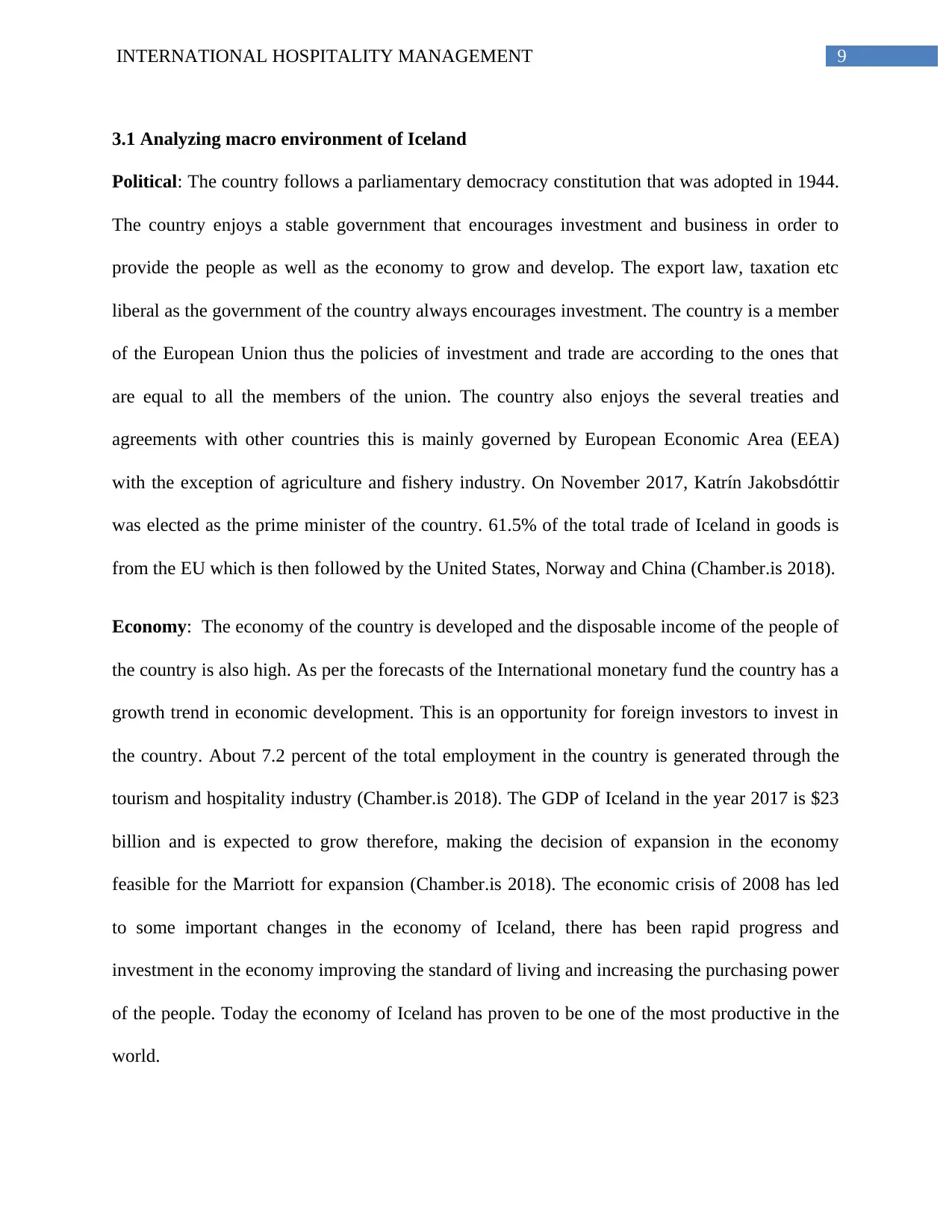
9INTERNATIONAL HOSPITALITY MANAGEMENT
3.1 Analyzing macro environment of Iceland
Political: The country follows a parliamentary democracy constitution that was adopted in 1944.
The country enjoys a stable government that encourages investment and business in order to
provide the people as well as the economy to grow and develop. The export law, taxation etc
liberal as the government of the country always encourages investment. The country is a member
of the European Union thus the policies of investment and trade are according to the ones that
are equal to all the members of the union. The country also enjoys the several treaties and
agreements with other countries this is mainly governed by European Economic Area (EEA)
with the exception of agriculture and fishery industry. On November 2017, Katrín Jakobsdóttir
was elected as the prime minister of the country. 61.5% of the total trade of Iceland in goods is
from the EU which is then followed by the United States, Norway and China (Chamber.is 2018).
Economy: The economy of the country is developed and the disposable income of the people of
the country is also high. As per the forecasts of the International monetary fund the country has a
growth trend in economic development. This is an opportunity for foreign investors to invest in
the country. About 7.2 percent of the total employment in the country is generated through the
tourism and hospitality industry (Chamber.is 2018). The GDP of Iceland in the year 2017 is $23
billion and is expected to grow therefore, making the decision of expansion in the economy
feasible for the Marriott for expansion (Chamber.is 2018). The economic crisis of 2008 has led
to some important changes in the economy of Iceland, there has been rapid progress and
investment in the economy improving the standard of living and increasing the purchasing power
of the people. Today the economy of Iceland has proven to be one of the most productive in the
world.
3.1 Analyzing macro environment of Iceland
Political: The country follows a parliamentary democracy constitution that was adopted in 1944.
The country enjoys a stable government that encourages investment and business in order to
provide the people as well as the economy to grow and develop. The export law, taxation etc
liberal as the government of the country always encourages investment. The country is a member
of the European Union thus the policies of investment and trade are according to the ones that
are equal to all the members of the union. The country also enjoys the several treaties and
agreements with other countries this is mainly governed by European Economic Area (EEA)
with the exception of agriculture and fishery industry. On November 2017, Katrín Jakobsdóttir
was elected as the prime minister of the country. 61.5% of the total trade of Iceland in goods is
from the EU which is then followed by the United States, Norway and China (Chamber.is 2018).
Economy: The economy of the country is developed and the disposable income of the people of
the country is also high. As per the forecasts of the International monetary fund the country has a
growth trend in economic development. This is an opportunity for foreign investors to invest in
the country. About 7.2 percent of the total employment in the country is generated through the
tourism and hospitality industry (Chamber.is 2018). The GDP of Iceland in the year 2017 is $23
billion and is expected to grow therefore, making the decision of expansion in the economy
feasible for the Marriott for expansion (Chamber.is 2018). The economic crisis of 2008 has led
to some important changes in the economy of Iceland, there has been rapid progress and
investment in the economy improving the standard of living and increasing the purchasing power
of the people. Today the economy of Iceland has proven to be one of the most productive in the
world.
Paraphrase This Document
Need a fresh take? Get an instant paraphrase of this document with our AI Paraphraser
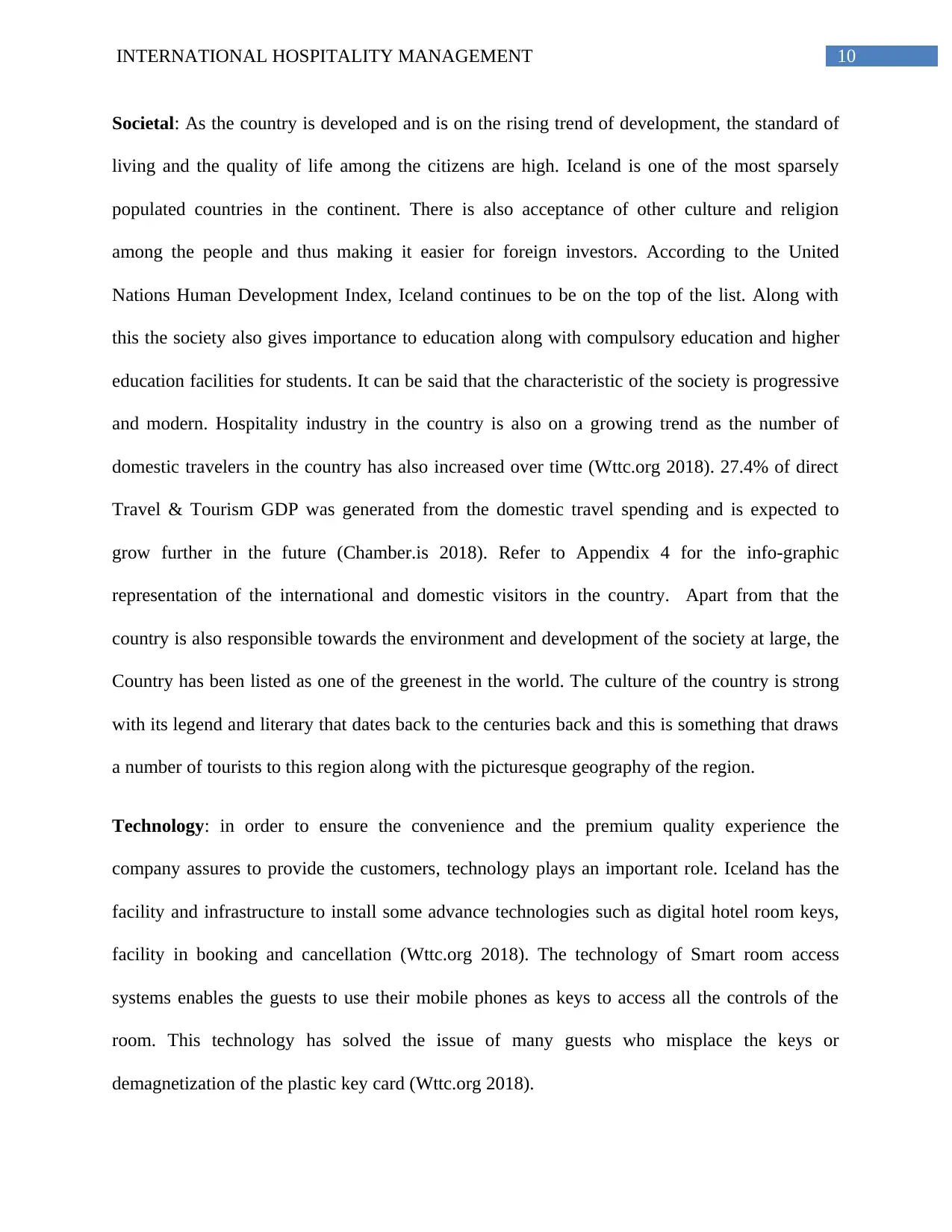
10INTERNATIONAL HOSPITALITY MANAGEMENT
Societal: As the country is developed and is on the rising trend of development, the standard of
living and the quality of life among the citizens are high. Iceland is one of the most sparsely
populated countries in the continent. There is also acceptance of other culture and religion
among the people and thus making it easier for foreign investors. According to the United
Nations Human Development Index, Iceland continues to be on the top of the list. Along with
this the society also gives importance to education along with compulsory education and higher
education facilities for students. It can be said that the characteristic of the society is progressive
and modern. Hospitality industry in the country is also on a growing trend as the number of
domestic travelers in the country has also increased over time (Wttc.org 2018). 27.4% of direct
Travel & Tourism GDP was generated from the domestic travel spending and is expected to
grow further in the future (Chamber.is 2018). Refer to Appendix 4 for the info-graphic
representation of the international and domestic visitors in the country. Apart from that the
country is also responsible towards the environment and development of the society at large, the
Country has been listed as one of the greenest in the world. The culture of the country is strong
with its legend and literary that dates back to the centuries back and this is something that draws
a number of tourists to this region along with the picturesque geography of the region.
Technology: in order to ensure the convenience and the premium quality experience the
company assures to provide the customers, technology plays an important role. Iceland has the
facility and infrastructure to install some advance technologies such as digital hotel room keys,
facility in booking and cancellation (Wttc.org 2018). The technology of Smart room access
systems enables the guests to use their mobile phones as keys to access all the controls of the
room. This technology has solved the issue of many guests who misplace the keys or
demagnetization of the plastic key card (Wttc.org 2018).
Societal: As the country is developed and is on the rising trend of development, the standard of
living and the quality of life among the citizens are high. Iceland is one of the most sparsely
populated countries in the continent. There is also acceptance of other culture and religion
among the people and thus making it easier for foreign investors. According to the United
Nations Human Development Index, Iceland continues to be on the top of the list. Along with
this the society also gives importance to education along with compulsory education and higher
education facilities for students. It can be said that the characteristic of the society is progressive
and modern. Hospitality industry in the country is also on a growing trend as the number of
domestic travelers in the country has also increased over time (Wttc.org 2018). 27.4% of direct
Travel & Tourism GDP was generated from the domestic travel spending and is expected to
grow further in the future (Chamber.is 2018). Refer to Appendix 4 for the info-graphic
representation of the international and domestic visitors in the country. Apart from that the
country is also responsible towards the environment and development of the society at large, the
Country has been listed as one of the greenest in the world. The culture of the country is strong
with its legend and literary that dates back to the centuries back and this is something that draws
a number of tourists to this region along with the picturesque geography of the region.
Technology: in order to ensure the convenience and the premium quality experience the
company assures to provide the customers, technology plays an important role. Iceland has the
facility and infrastructure to install some advance technologies such as digital hotel room keys,
facility in booking and cancellation (Wttc.org 2018). The technology of Smart room access
systems enables the guests to use their mobile phones as keys to access all the controls of the
room. This technology has solved the issue of many guests who misplace the keys or
demagnetization of the plastic key card (Wttc.org 2018).
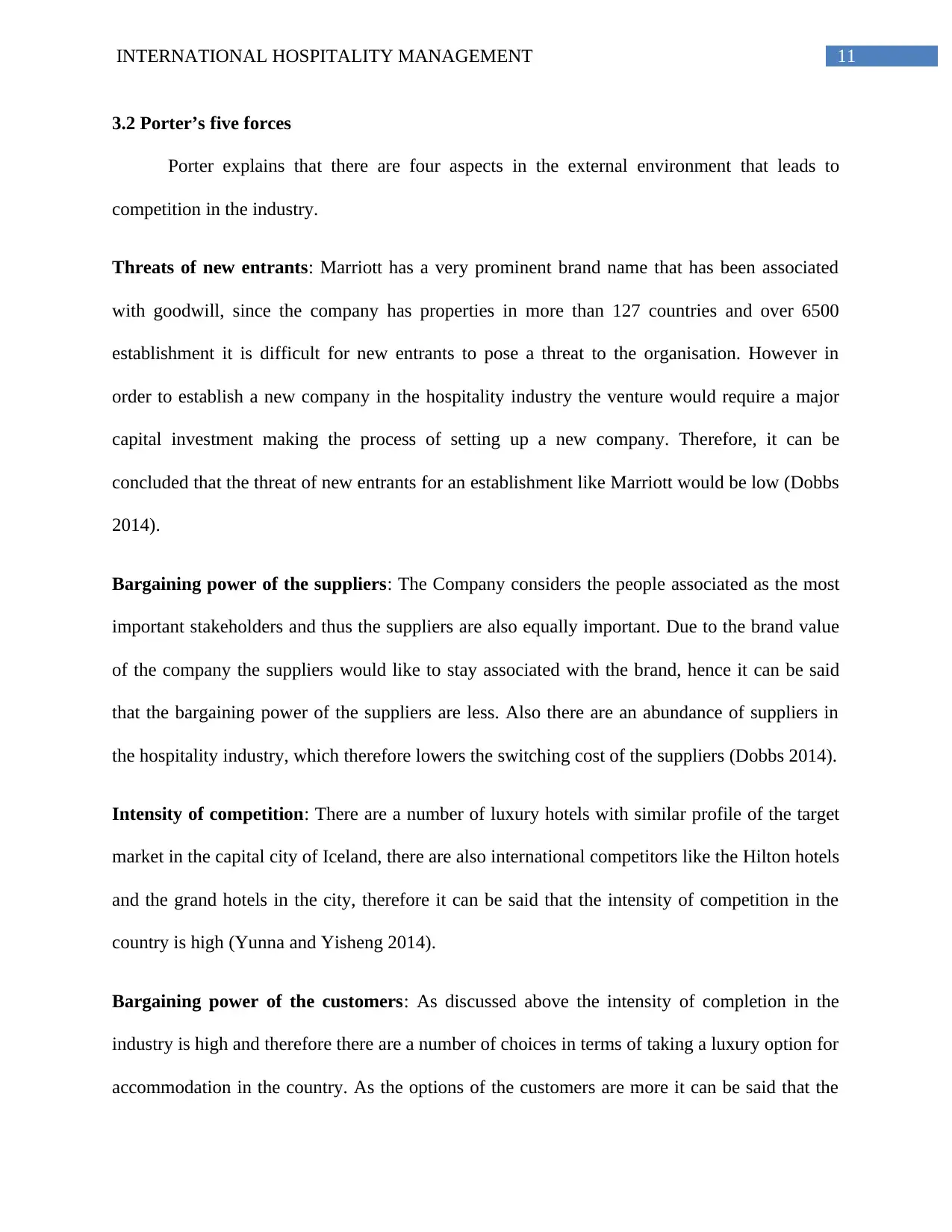
11INTERNATIONAL HOSPITALITY MANAGEMENT
3.2 Porter’s five forces
Porter explains that there are four aspects in the external environment that leads to
competition in the industry.
Threats of new entrants: Marriott has a very prominent brand name that has been associated
with goodwill, since the company has properties in more than 127 countries and over 6500
establishment it is difficult for new entrants to pose a threat to the organisation. However in
order to establish a new company in the hospitality industry the venture would require a major
capital investment making the process of setting up a new company. Therefore, it can be
concluded that the threat of new entrants for an establishment like Marriott would be low (Dobbs
2014).
Bargaining power of the suppliers: The Company considers the people associated as the most
important stakeholders and thus the suppliers are also equally important. Due to the brand value
of the company the suppliers would like to stay associated with the brand, hence it can be said
that the bargaining power of the suppliers are less. Also there are an abundance of suppliers in
the hospitality industry, which therefore lowers the switching cost of the suppliers (Dobbs 2014).
Intensity of competition: There are a number of luxury hotels with similar profile of the target
market in the capital city of Iceland, there are also international competitors like the Hilton hotels
and the grand hotels in the city, therefore it can be said that the intensity of competition in the
country is high (Yunna and Yisheng 2014).
Bargaining power of the customers: As discussed above the intensity of completion in the
industry is high and therefore there are a number of choices in terms of taking a luxury option for
accommodation in the country. As the options of the customers are more it can be said that the
3.2 Porter’s five forces
Porter explains that there are four aspects in the external environment that leads to
competition in the industry.
Threats of new entrants: Marriott has a very prominent brand name that has been associated
with goodwill, since the company has properties in more than 127 countries and over 6500
establishment it is difficult for new entrants to pose a threat to the organisation. However in
order to establish a new company in the hospitality industry the venture would require a major
capital investment making the process of setting up a new company. Therefore, it can be
concluded that the threat of new entrants for an establishment like Marriott would be low (Dobbs
2014).
Bargaining power of the suppliers: The Company considers the people associated as the most
important stakeholders and thus the suppliers are also equally important. Due to the brand value
of the company the suppliers would like to stay associated with the brand, hence it can be said
that the bargaining power of the suppliers are less. Also there are an abundance of suppliers in
the hospitality industry, which therefore lowers the switching cost of the suppliers (Dobbs 2014).
Intensity of competition: There are a number of luxury hotels with similar profile of the target
market in the capital city of Iceland, there are also international competitors like the Hilton hotels
and the grand hotels in the city, therefore it can be said that the intensity of competition in the
country is high (Yunna and Yisheng 2014).
Bargaining power of the customers: As discussed above the intensity of completion in the
industry is high and therefore there are a number of choices in terms of taking a luxury option for
accommodation in the country. As the options of the customers are more it can be said that the
⊘ This is a preview!⊘
Do you want full access?
Subscribe today to unlock all pages.

Trusted by 1+ million students worldwide
1 out of 30
Related Documents
Your All-in-One AI-Powered Toolkit for Academic Success.
+13062052269
info@desklib.com
Available 24*7 on WhatsApp / Email
![[object Object]](/_next/static/media/star-bottom.7253800d.svg)
Unlock your academic potential
Copyright © 2020–2025 A2Z Services. All Rights Reserved. Developed and managed by ZUCOL.




